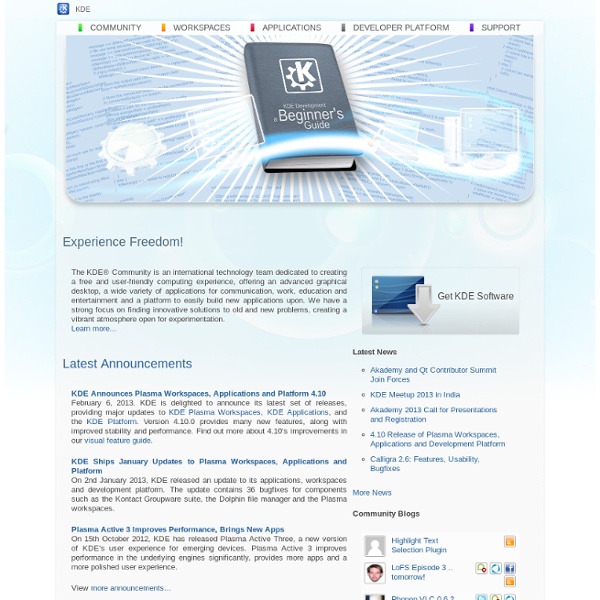SliTaz
SliTaz GNU/Linux is a light-weight, community-based Linux distribution suitable for use on older hardware or as a Live CD or Live USB.[3][4][5][6] System requirements[edit] SliTaz GNU/Linux is supported on all machines based on the i486 or x86 Intel compatible processors.[2] The Live CD has four variants of SliTaz, requiring from 192 MB of RAM for the Core system to 48 MB for a text mode and X Window System.[2] Slitaz can even run in 16 megabytes of RAM and a little swap memory. [7] SliTaz can be booted from a Live CD, Live USB, floppy disk, or a local area network,[8] or can be installed, requiring approximately 100 MB of hard disk space.[9] Release history[edit] Gallery[edit]
Got the Dot?
Cygwin
Get that Linux feeling - on Windows What... ...is it? Cygwin is: a large collection of GNU and Open Source tools which provide functionality similar to a Linux distribution on Windows. a DLL (cygwin1.dll) which provides substantial POSIX API functionality.
Zorin OS - Tour
Main advantages The Zorin OS operating system gives you the ultimate desktop experience. Some of the advantages of Zorin OS:
KDE für deutschsprachige Benutzer - Freiheit genießen!
Internet
U.S. Army soldiers "surfing the Internet" at Forward Operating Base Yusifiyah, Iraq The Internet is a global system of interconnected computer networks that use the standard Internet protocol suite (TCP/IP) to link several billion devices worldwide. It is a network of networks[1] that consists of millions of private, public, academic, business, and government networks of local to global scope, linked by a broad array of electronic, wireless, and optical networking technologies.
KDE Community Forums
The LinuxThreads library
LinuxThreads is an implementation of the Posix 1003.1c thread package for Linux. Unlike other implementations of Posix threads for Linux, LinuxThreads provides kernel-level threads: threads are created with the new clone() system call and all scheduling is done in the kernel. The main strength of this approach is that it can take full advantage of multiprocessors. It also results in a simpler, more robust thread library, especially w.r.t. blocking system calls.
Application software
Application software is all the computer software that causes a computer to perform useful tasks beyond the running of the computer itself. A specific instance of such software is called a software application, application program, application or app.[1] The term is used to contrast such software with system software, which manages and integrates a computer's capabilities but does not directly perform tasks that benefit the user.
Linux
Linux ( History[edit] Antecedents[edit] With AT&T being required to license the operating system's source code to anyone who asked (due to an earlier antitrust case forbidding them from entering the computer business),[23] Unix grew quickly and became widely adopted by academic institutions and businesses. In 1984, AT&T divested itself of Bell Labs. Free of the legal obligation requiring free licensing, Bell Labs began selling Unix as a proprietary product.
Music
This article is about music as a form of art. For history see articles for History of music and Music history. The creation, performance, significance, and even the definition of music vary according to culture and social context. Music ranges from strictly organized compositions (and their recreation in performance), through improvisational music to aleatoric forms.



